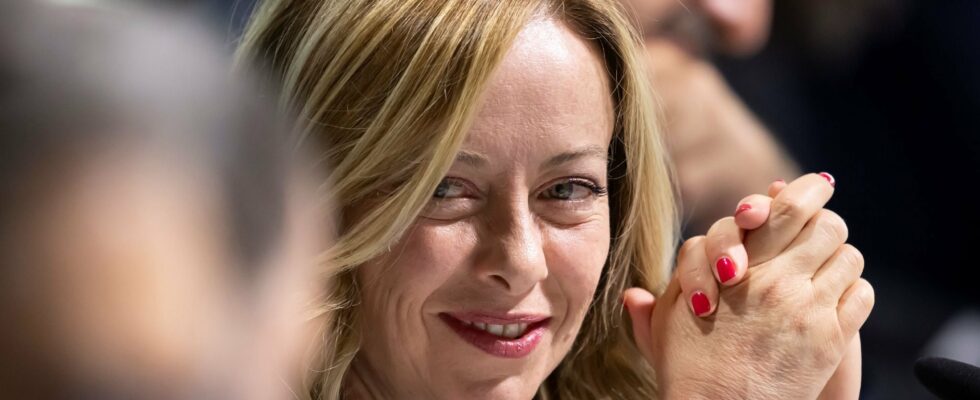“RAI is under the thumb of the Meloni government!” This is the cry launched by the unions of the public audiovisual service bringing together five general television channels, eight thematic channels and three national radio stations. A conglomerate employing nearly 13,000 employees, including 1,760 journalists. This behemoth dedicated to information and entertainment has, however, always maintained very tenuous relationships with political power, accustomed to being “taken over” with each change of majority, by virtue of the traditional “lottizzazione” (Editor’s note: “attribution ” in Italian): a sort of post-electoral “mercato” where the parties in power share the choice of management positions within public organizations.
Barely installed as President of the Board in October 2022, Giorgia Meloni places her relatives at the head of the company. Starting with Giampaolo Rossi. The fifty-year-old knows the workings of RAI by heart, where he has worked since 2004 as a manager. He is known there for his boundless admiration for “strong men”, notably Hungarian Prime Minister Viktor Orban and Russian President Vladimir Putin. And displays without complexes his conspiratorial tendencies and his pro-Russian positions on his blog, hosted by the far-right daily Il Giornale. Close to Giorgia Meloni, he is the man who brought RAI into line. From the summer of 2023 he cancels the program of the writer Roberto Saviano on the fight against the mafia, after his criticism of the minister Matteo Salvini. The resounding resignations of certain emblematic journalists follow one another, refusing, in their own words, to become “political prisoners”.
No need to go further by ending public service, therefore. “The idea of privatizing public broadcasting, as the National Rally in France promises, would be incongruous in Italy,” observes Alberto Carnevale Maffè, professor of strategy at Bocconi University in Milan and media specialist. The parties consider the RAI as a loot that they can share between themselves. Useful in a country where the population is elderly and gets its information mainly from television. In Italy, there is no Higher Audiovisual Council but a parliamentary commission which meets the same criteria of “lottizzazione”. “It is a question,” continues this analyst, “of monitoring an RAI which is always servile in relation to the power in place – whoever it may be. But this time, we are witnessing a form of purification.”
Climate of intimidation
“Giampaolo Rossi transformed RAI into Télé Meloni, confides one of his journalists. The appointments following a change of majority have always met loyalty criteria but they preserved a veneer of competence. It has been shattered. Now, the pressures are frequent. There is a climate of intimidation at RAI. Ministers do not hesitate to threaten to take us to court if we criticize them. Like the day when an editor-in-chief stormed into a journalist’s office to silence an “ugly” figure: his report on tourism mentioned a 10% drop in Italians going on vacation due to inflation . “Rai has become a megaphone for the government’s positions,” laments our source.
A deprogrammed Mussolini biographer
This is evidenced by another episode, which took place in the middle of the Sanremo festival this winter. Invited to the annual meeting of Italian song, bringing together millions of viewers, the Italian-Tunisian rapper Ghali launches a “Stop the genocide”, reference to the ongoing war in Gaza. An RAI presenter is forced to read live a statement supporting the government in Israel. Giorgia Meloni’s opponents scream propaganda.
“The Scurati affair” (named after the writer Antonio Scurati) will give them a tremendous echo. On the occasion of Liberation Day (April 25), the author, known for his series of novels on Benito Mussolini, was to speak on a public channel. He planned to denounce Georgia Meloni’s reluctance to repudiate her party’s fascist roots. Words that were never heard on television: the monologue was canceled at the last moment. Internal RAI documents published in the Italian press mention “editorial reasons”.
But the President of the Council wants to bury this censorship affair. Giorgia Meloni picks up her phone to call her friend, Giampaolo Rossi. Objective ? Agree on a completely different version of the story. To the bosses of RAI, the director asks to justify the deprogramming by financial reasons, in this case the excessively high amount of the fee that Antonio Scurati would have requested. The presenter of the show in which he was to appear, Serena Bortone, has since been targeted by disciplinary action and risks her job.
“The control of RAI leaders over public service information is becoming more suffocating every day” denounced the union press release on the occasion of the strike launched on May 6. “Freedom of expression still exists in Italy, but it is becoming more and more difficult for some,” notes Roberto Saviano. “The message is clear: if you want to work, lower your head and keep silent about the government.”
.
